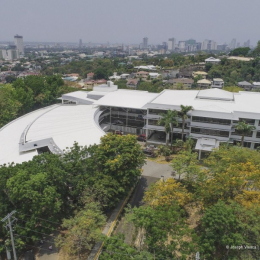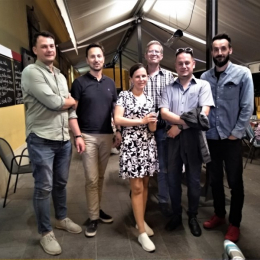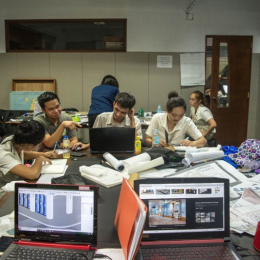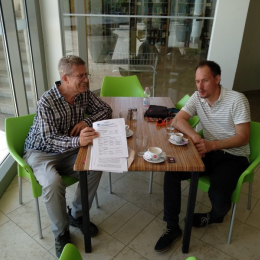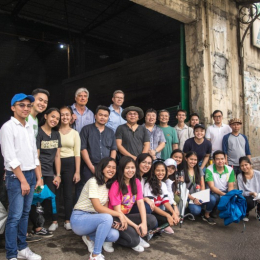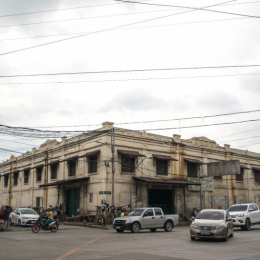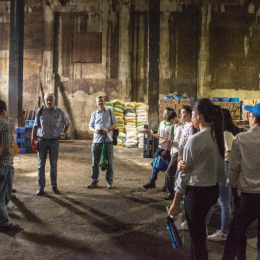University of San Carlos, Cebu, Philippines
Learning from each other
(Article by Béla Lányi published in Országút on 17 August 2022. Original article: Tanulni egymástól | Országút (orszagut.com)
Two worlds are connected by Béla Lányi, a missionary brother working in the Philippines, who serves his order as an architect-teacher and faith teacher at the Verbite University of Cebu. He was instrumental in establishing fruitful professional cooperation between the University of Pécs and the University of San Carlos.
"You should visit me instead", I wrote back in January 2015, when the well-known Hungarian architect András Kertész sent me an email inviting me to Manila, the capital of the Philippines. He was a guest of the College of Architecture of the famous "Pontifical and Royal" University of Santo Tomas, founded in 1930, as a member of the delegation of the Institute of Architecture at the Faculty of Engineering and Information Technology of the University of Pécs, accompanied by Dean Bálint Bachmann and Vice-Dean Gabriella Medvegy.
After some deliberation, the collegues from Pécs gave in and came to us in Cebu, the second largest city in the Philippines, five hundred and seventy kilometres from Manila. Our Catholic order of monks, the Verbite Mission, maintains the University of San Carlos here.
At the time, as head of the Department of Architecture there, I was responsible for the professional and human development of some 1,500 students.
The Hungarian delegation did not regret this visit, as they were received with great interest by our lecturers and students under the leadership of Dean Joseph Michael Espina. A few months later, the agreement of cooperation between the two universities was signed.
In socialist Hungary, only the capital had university-level architectural education. This is why the former Budapest University of Technology, now known as the Budapest University of Technology and Economics, had and still has a tradition of internationally renowned and famous professors and well-structured education. The Pécs School of Architecture has a much shorter history, although it was part of the first university in Hungary, founded in 1367.
As a result of the work of the distinguished professor Zoltán Bachmann and his friends, the former technical college became a university faculty in 2004.
The dynamic education in Pécs is worthy of its university status: it is ambitious, receptive to new achievements and open to international relations.
In 2015, when our contacts were established, the partner Verbite university in Cebu had twenty-five thousand students. Founded in 1595, this university is considered the oldest school in the Philippines. It has only been a university for seventy-five years, and its architectural education dates back seventy years. As the intellectual life of the Philippines is also centred in the capital, the University of Cebu, the second intellectual centre of the islands, has long played a secondary role. All that changed when Joseph Michael Espina, Dean of the Faculty of Architecture, following in his father's footsteps, has highlighted and established the competitiveness of the training, with an intellectual challenge that sees the human being, human dignity and personality in every architectural task.
Our architecture students from Cebu started coming to Pécs in 2015: three students per semester. Although they were exempt from tuition fees under the agreement between the two universities, all other costs had to be paid by their families. This unusually large financial sacrifice was often only possible with the whole family pulling together. But they came! The reason:
Those who have studied in Europe are highly regarded in Asia, and the semesters spent in Pécs have proved to be a good investment.
Later, we also sent lecturers from Cebu for further training in Pécs. One of them, Rowell Shih, obtained his doctorate there, with a typically Cebu topic: the analysis and modernisation of special shelter designs to provide protection against the often devastating typhoons. This was considered by the evaluators in Pécs to be remarkable from a Hungarian perspective, as special emergencies can also occur in Europe.
Although three students from Hungary were also expected to come to Cebu each semester in the spirit of reciprocity, the Hungarian students only agreed to come on condition that they covered their costs, as they have a wide range of scholarships to choose from as citizens of the European Union. So far, only one successful and talented student from Pécs, Karolina Juhász, has arrived in Cebu with Erasmus Mundus support. However, we were delighted to welcome Hungarian academics.
First in 2016 Donát Rétfalvi, head of department, associate professor from Pécs, spent a semester in Cebu.
He gave lectures and led exercises in collaboration with the locals. Despite all the new experiences, he managed to fit in well. At first, he was surprised at the size of the classes, as there were 30 students per practical design class in Cebu at the time, compared to 12 in Pécs. He soon noticed that Cebu was producing high-quality student designs despite the more difficult conditions. Finally, he also experienced the good cooperation between students and teachers that is one of the secrets of the University of Cebu's success.
But most of all, it was the visit of our Cebu officials to Pécs in 2017 that brought the two universities closer together. Dean Espina and the new head of the architecture department, Margret Rosario, had the opportunity to study at close quarters how a - with an Asian perspective - small town like Pécs has achieved such international recognition, attracting thousands of foreign students. They were deeply impressed by the family atmosphere and creative spirit they experienced in Pécs.
The following year, thanks to the Erasmus Mundus programme, we were able to enrich each other with joint workshops. In Cebu, under the guidance of Professor Kertész, we investigated how a storage building built in 1925, with unique decoration and listed status, could be transformed for a new, modern use.
As the building is located in a popular touristic spot in the centre of the city, many students have dreamed of a visitors' centre or even a maritime museum within its ancient walls, as there are not enough facilities in this part of the city to serve the dining and other needs of tourists.
Our young lecturer from Cebu, Neil Andrew Menjares, travelled to Pécs for a week to share his principles of urban design with his audience. For the last three years, we have also been awarded an Erasmus Mundus scholarship, but the coronavirus has thwarted our calculations. By the time the epidemic had died down, we only had enough funds for the second semester of the 2021/2022 academic year. We were delighted to find two enthusiastic teachers from Pécs, Krisztián Kovács-Andor and Péter Zilahi, who braved the fear of the coronavirus and the resulting difficulties to board the plane to Cebu
As there was no classroom teaching at that time, the Cebu locals first wondered how to make the most of this opportunity, as the situation did not allow for a seminar like the highly successful Kertész workshop. The visiting professors were only able to give their lectures via the internet. However, as Krisztián is an expert in historic preservation and Peter in solidarity housing, we took them to the places where the University of Cebu is doing practical work on this topic. There was a lot to show! We went to to the historic churches damaged by the December 2021 super typhoon, and to a small island where a school for the poor with a rainwater reservoir and evacuation centre is being built.
Although it was not part of the exchange programme, I visited Pécs in May 2022 and had the opportunity to give a presentation on private cities in the Philippines, where large and elegant residential areas are privately owned. These are a powerful way of transposing neoliberal thinking into urban planning, to which the weak state of the archipelago shows little resistance. Several academics in Pécs noted that this trend is also incipient in Hungary, although it has not yet gained the momentum it has in Southeast Asia. Could 'private cities' spread to Hungary? So we have much to learn from each other. And we can, because in many respects, on fundamental issues, the two universities have very similar thinking and attitudes. We hope that the good cooperation will continue.


